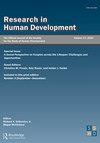Flux: Insights into the Social Aspects of Life Transitions
IF 1.4
4区 心理学
Q4 PSYCHOLOGY, DEVELOPMENTAL
引用次数: 12
Abstract
Life transitions are often conceptualized and studied as individual experiences. But in reality, transitions are rarely individual: they are relational. We offer a set of insights into the social aspects of transitions. Transitions are experienced with and alongside others in states of interdependence. Family and other relationships can be key sources of support for transitions but also create risks. Changes in the transition patterns of cohorts are fertile ground for intergenerational tension in families and societies. Much of the action relevant to understanding life transitions is also found in the mind, in processes related to inequality, and in invisible forces related to history, demography, and institutions. Illustrations reinforce the principle that to understand the personal, we must look beyond the personal. Because transitions have strong social aspects, they can be strengthened through interventions, institutions, and policies.变化:洞察生活转变的社会方面
生活的转变通常被概念化,并作为个人经历进行研究。但在现实中,过渡很少是个人的:它们是相互关联的。我们提供了一系列关于过渡的社会方面的见解。在相互依赖的状态下,过渡是与他人一起经历的。家庭和其他关系可能是过渡时期的主要支持来源,但也会产生风险。群体过渡模式的变化是家庭和社会中代际关系紧张的肥沃土壤。许多与理解生命转变相关的行为也存在于思想中,存在于与不平等相关的过程中,存在于与历史、人口和制度相关的无形力量中。插图强化了这样一个原则:要理解个人,我们必须超越个人。由于转型具有强烈的社会影响,因此可以通过干预措施、制度和政策来加强转型。
本文章由计算机程序翻译,如有差异,请以英文原文为准。
求助全文
约1分钟内获得全文
求助全文

 求助内容:
求助内容: 应助结果提醒方式:
应助结果提醒方式:


